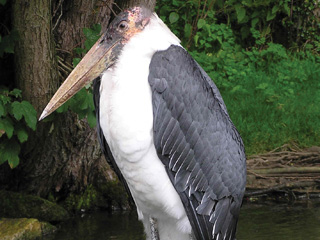Giant Stork Flies in to Birdland

A stork which is believed to have the largest wingspan of any living bird is settling in to its new home at Birdland in Bourton-on-the-Water.
Also known as the ‘undertaker bird’ due to its slow walk, cloak-like wings, thin white legs and mass of white hair-like feathers, the marabou stork come from sub-Saharan Africa.
A wingspan of 3.7 metres, or 12 feet, has been recorded, making it a rival in size to the Andean condor and there are reports of birds measuring in excess of four metres – although this has not been independently verified.
The new arrival, who is aged 17, is female and it is hoped she will pair up with the park’s resident male.
However keepers are taking their time with the introductions as the birds, which are more than 1.5 metres tall, do have a reputation for fighting when they first meet.
“They really are one of the planet’s most extraordinary looking birds and we’re delighted to have a female to join our existing male,” said Birdland’s Simon Blackwell.
“If all goes to plan and they do hit it off they would build a small nest of sticks and lay two to three white eggs which would be incubated for 30 days,” he added.
Marabou storks feed mainly on carrion in the wild but can take adult flamingos, as well as fish and insects. Birdland’s male has even been seen catching large trout from the river which runs through its aviary.
Increasingly, marabous have become dependent on human garbage and hundreds of the huge birds can be found around African dumps or waiting for a hand out in urban areas.
Marabous eating human garbage have been seen to devour virtually anything that they can swallow, including shoes and pieces of metal.
With its combination of woodland, riverside and gardens, Birdland features more than 500 birds, ranging from a colony of king penguins and parrots to cassowaries and cranes.
Explore Gloucestershire
28 August 2013
For further information.
OTHER NEWS
